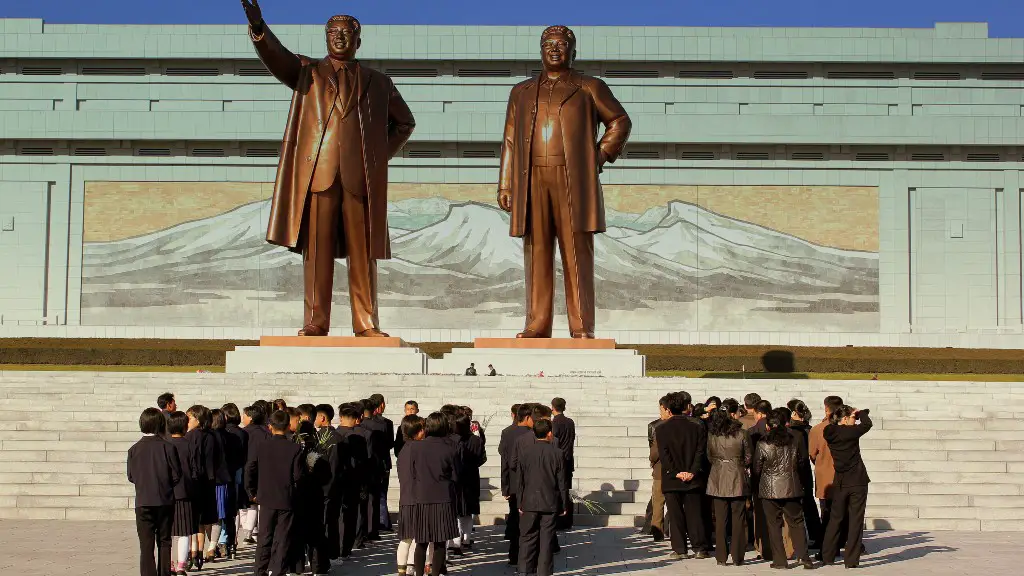Background Information
North Korea and the United States have had a strained relationship since the 1950s. North Korea officially declared itself an enemy of the US in the 1970s and has kept that stance ever since. The US believes North Korea is a major threat to global stability and security, especially because of its nuclear weapons program. North Korea has long maintained an antagonistic stance towards the US, prompting the US to put economic sanctions and pressure on the country in an attempt to curb its nuclear ambitions. Relations between the two countries have been difficult, but the United States has tried to convince North Korea to abandon its nuclear ambitions.
Relevant Data
The strained relationship between the two countries goes back to the Korean War in the early 1950s, when the United States and other countries fought alongside South Korea against North Korea and its allies. Since then, the countries have been at odds, but tensions have escalated significantly since North Korea began testing nuclear weapons in the early 2000s. North Korea claims it needs nuclear weapons to deter what it views as the hostile policy of the United States, while the US has argued that North Korea needs to abandon its nuclear ambitions before it can receive economic assistance and diplomatic recognition.
Currently, North Korea is under intense economic and diplomatic pressure from the US and its allies. The US and other countries have imposed economic sanctions on North Korea, and the US has continued to increase sanctions since North Korea conducted nuclear tests in 2016 and 2017. North Korea also faces heavy pressure from China, its most important ally and trading partner, to end its nuclear weapons program.
Perspectives from Experts
Experts have differing views about why North Korea is against the United States. Some experts argue that North Korea’s hostility towards the US is a result of the US’s policy of isolating and punishing North Korea. Others believe it’s an attempt to gain recognition and attention from the US to pressure it into dialogue. Some experts have argued that North Korea’s actions are an attempt to gain leverage over the US in international affairs.
In addition, some experts suggest that North Korea’s officials view the US as a threat to the regime’s survival and are trying to deter the US by threatening it with nuclear weapons. North Korean officials have also accused the US of engaging in “hostile” and “unilateral” policies towards the country.
Analysis and Insights
In analyzing North Korea’s stance against the US, it is clear that the country views the US as a major threat to its security and stability. North Korea’s leaders have expressed a desire to be treated as an equal in international relations, but have alleged that the US is deliberately trying to isolate and punish it.
The US has maintained its position that North Korea should abandon its nuclear weapons program and dismantle other weapons of mass destruction before it can receive any economic or diplomatic help from the US. This position has angered North Korea and further entrenched the country’s hostility towards the US.
It is also apparent that North Korea’s antagonism towards the US is fueled by its fear of US military power. It is likely that North Korea is trying to deter potential US aggression by threatening it with nuclear weapons.
Perceived Impact of US Sanctions
US sanctions have had an immense impact on North Korea’s economy. Sanctions have limited the country’s access to international trade and other resources, led to currency instability, and hampered economic growth. In addition, the sanctions have exacerbated the humanitarian crisis in North Korea, leading to a severe lack of food, medicine, and other necessities.
Experts have suggested that the sanctions have had a negative effect on the political and economic environment in North Korea and have weakened the country’s totalitarian government. However, the sanctions have not had any significant impact on North Korea’s nuclear weapons program, suggesting that the US’s strategy of sanctions has been unsuccessful.
Consequences of North Korean Hostility
North Korea’s hostility towards the US has had a number of serious consequences. In addition to stalling diplomacy and increasing the risk of a potential military confrontation between the two countries, North Korea’s antagonism has also had a negative impact on how North Korea is viewed by the international community. North Korea is widely seen as an isolated and pariah state, and its reputation has been tarnished due to its hostile actions against the US and its allies.
Effects of US Policy Change
The US has shifted its policy toward North Korea in recent years, as it looks for diplomatic solutions to the conflict. The US and North Korea have held several rounds of talks in an attempt to reach a diplomatic solution, but the talks have so far been inconclusive.
The US has also changed its rhetoric towards North Korea in recent years, toning down the hostile language and focusing more on dialogue and cooperation. This toned-down rhetoric has led to some progress, such as North Korea allowing the return of some US citizens held in the country, as well as increasing cultural exchanges between the two countries.
Opposition to Negotiations
Not everyone is in favor of negotiations with North Korea. Many US citizens, politicians, and military officials oppose any kind of talks with North Korea, arguing that the country cannot be trusted and will likely not uphold any agreement it makes.
Critics argue that North Korea may simply use negotiations as a way to gain concessions from the US, such as economic aid and the lifting of sanctions, while continuing to develop its nuclear and missile program. US officials have also accused North Korea of engaging in human rights abuses and argue that the country should not be rewarded with diplomatic recognition until it ends these abuses.
Opening for Dialogue
Despite the opposition to negotiations with North Korea, there may still be an opportunity for dialogue between the two countries. Both sides have signaled their willingness to find a diplomatic solution, and the US has continued to try and engage with North Korea over the years.
The US and other countries are also trying to encourage North Korea to take the necessary steps to become an accepted member of the international community, such as abandoning its nuclear ambitions, taking steps to improve its human rights situation, and engaging in meaningful dialogue with its neighbors.
Regardless of whether or not North Korea and the US can reach an agreement, it is clear that both sides will need to compromise in order to move forward. North Korea will need to be willing to abandon its nuclear ambitions and the US will need to offer some sort of concessions in return. It remains to be seen if North Korea and the US can come to an agreement, but the potential remains for more diplomatic engagement between the two countries.


